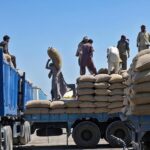UNITED NATIONS, Mar 26 (APP): Around 13 million people in Ukraine are unable to flee hostilities due to blockades and damaged roads while the high number of civilian casualties and destruction of infrastructure points to possible war crimes in the ongoing Russian military offensive, United Nations agencies have warned.
The conflict in Ukraine has so far displaced at least 10 million people, over 3.7 million of whom have sought refuge abroad, according to the UN.
“These numbers are rising daily, ” Karolina Lindholm, representative of the UN refugee agency (UNHCR) in Ukraine, told reporters via video-link from Lviv on Friday.
“Some 13 million people are estimated to be stranded in affected areas or unable to leave due to heightened security risks, destruction of bridges and roads, as well as lack of resources or information on where to find safety and accommodation.”
The UN human rights representative in Ukraine, Matilda Bogner, said Friday there was evidence to suggest that damage to civilian buildings and other infrastructure as well as the high casualty toll in Ukraine could constitute international human rights violations and war crimes.
Bogner added that her office had received reports of Russian troops opening fire and killing civilians fleeing in cars as well as peaceful protesters in areas of Ukraine occupied by Russian forces.
With long-established roots in assisting Ukraine, UNHCR said its current focus inside the country is to provide immediate relief to those fleeing the war, by providing protection, shelter, emergency cash and in-kind assistance. UNHCR teams and local partners have been deployed at border points, in transit and reception centres, too.
The UN has continued to push to reach populations at greatest risk “in eastern Ukraine, in Kharkiv, Donetsk, Luhansk oblast, as well as in the south, Kherson and Kiev”, Ms. Lindholm, the UNHCR official said.
“They are blocked in these areas that are encircled or where the roads are now inaccessible, due to mines and, for example, burnt-out vehicles. This has been one of the reasons why it’s so difficult to get to Mariupol.”
Echoing that dire assessment, the UN World Food Programme (WFP) explained that the country’s food supply chain was “broken”.
Speaking to journalists in Geneva, WFP spokesperson Tomson Phiri said that existing systems that feed tens of millions trapped inside Ukraine were “falling apart, (with) trucks and trains destroyed, airports bombed, bridges fallen, supermarkets emptied, and warehouses drained”.
WFP also warned that situation is more desperate than ever in the southern city of Mariupol which has been subject to constant Russian shelling.
“The encircled city of Mariupol is running out of its last reserves of food and water,” said Mr. Phiri. “No humanitarian aid has been allowed into the city since it was encircled on 24 February. The only way to reach Mariupol is through humanitarian convoys which until now have not made it through.”
Since Russian armed forces launched their attacks on 24 February, at least 1,035 civilians have been killed and at least 1,650 injured, The UN rights office official said, adding the caveat that the figure “is likely much higher in locations that have seen intense fighting, in particular Mariupol and Volnovakha…If we look at Mariupol, clearly the number of deaths of civilian casualties there is significantly higher.
“We are trying to look into the scale, we have”, adding that they are get more information “on mass graves that are there.”
Since February the UN and partners said they have delivered over 2,700 tonnes of food and medical supplies and over 1,100 tonnes of water, sanitation and hygiene items.






